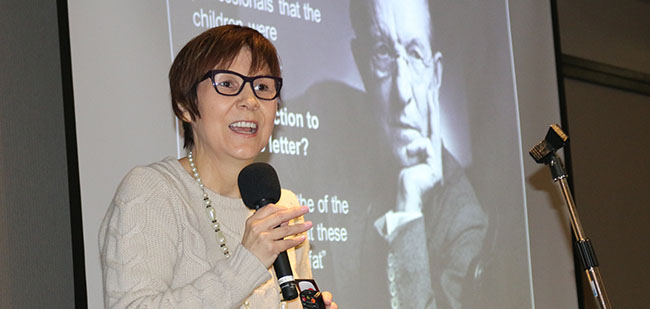‘Change happens with the people of Canada, not the government’: Blackstock

By Marci Becking
SAULT STE. MARIE — Dr. Cindy Blackstock got every participant in the room engaged in her presentation at the “Awakening the Nation — Renewing the Spirit” health conference today.
“Governments do not create change, they respond to change,” says Blackstock. “The change happens with the people of Canada, not the government. The best letters that you will ever get are written in crayons and pencil crayons. The biggest contributors to The Caring Society are children.”
Blackstock reminds us that on February 14, to have a heart for First Nations children. Send Valentine’s Day cards to the Prime Minister to ensure First Nations children can grow up safely at home, get a good education, be healthy and proud. www.fncaringsociety.com/have-a-heart. She encourages work places, health centres to host a Valentine’s Day party in their work place to educate others.
“I am going to keep sending Valentines until every First Nations child in Canada gets what they deserve,” says Blackstock. “Within all of our hearts, we need to stop this inequality. Do everything you can so that we can raise a generation of First Nations kids who will
At the first “Have a Heart” day on Parliament Hill, 700 children showed up with signs and a microphone. No adults are allowed to talk. Kids understand that you change the world with love.
Blackstock reminded conference participants of the legacy of Canada’s Residential Schools. She provided facts such as the odds of dying for children in Indian residential schools – 1 in 25. Odds of dying for Canadians serving in WWII – 1 in 26.
One of the important things to know about Duncan Campbell Scott (former Deputy Superintendent of Indian Affairs) is that in 1895 he asked the Department of Justice for a warrant for the removal of children — not for education purposes — but because they weren’t being properly cared for, neglected.
“I looked into it and the definition of neglect at the time was basically the same as it is today — but they were impoverished. Instead of dealing with the poverty, they took the children away,” says Blackstock. “We have to be all working together. The top Truth and Reconciliation Commission’s call to action is Child Welfare. Why? because there are more kids in care today than there were ever in residential schools.”
Blackstock says that 66 million is the number of nights First Nations children spent in foster care from 1989 to 2012.
“We can and we must do better. We need the equity and funding from the federal government,” she continues. “Children are the best investment a government can make.”
Blackstock also reminded the group of the I am a witness campaign. Her Human Rights case alleges Canada’s provision of child welfare is discriminatory pursuant to the Canadian Human Rights Act. APTN filmed all testimony and closing arguments.
The ruling will happen before January 29.
Canada ranks 57th in the world in terms of respecting children’s rights — The KidsRights Index
Dr. Cindy Blackstock is the Executive Director of the First Nations Child and Family Caring Society of Canada, Associate Professor, University of Alberta and the Director of FNCARES. She is a citizen of Gitksan First Nation. Find out more at www.fnwitness.ca

